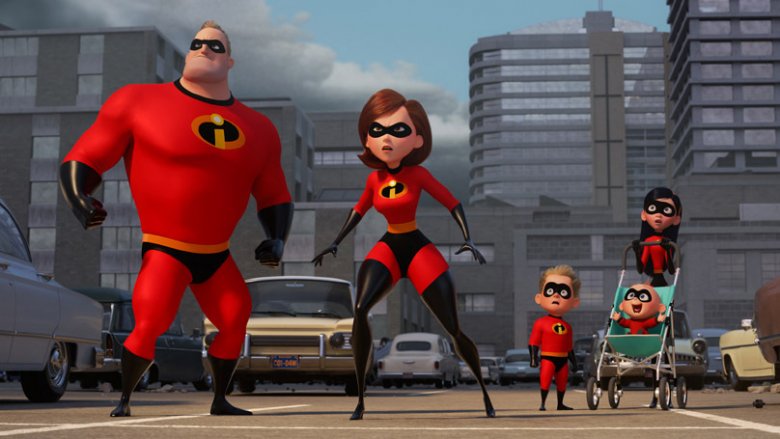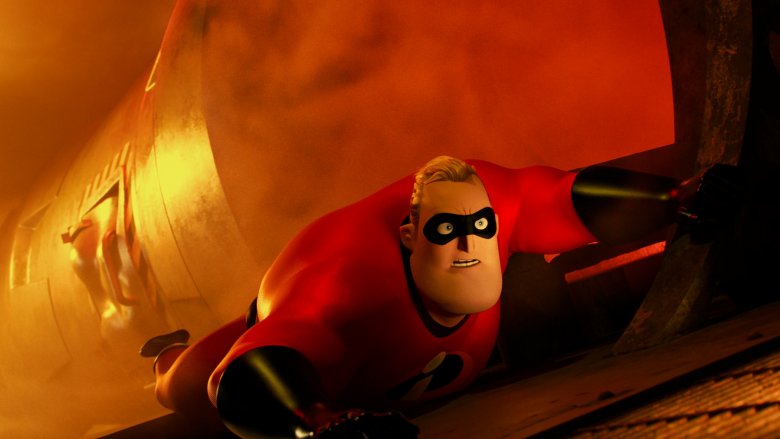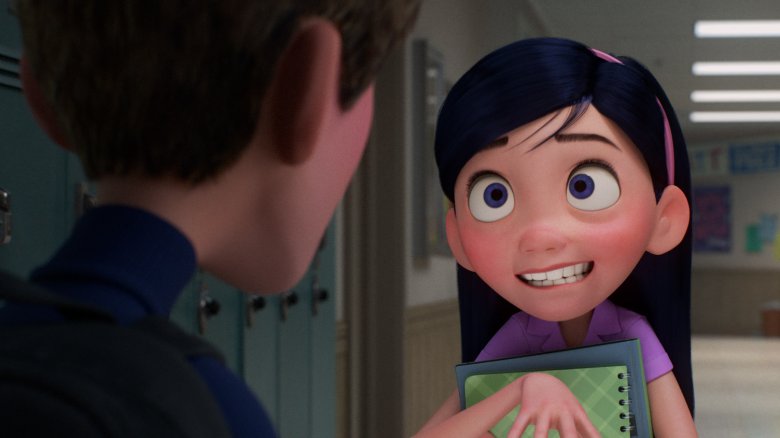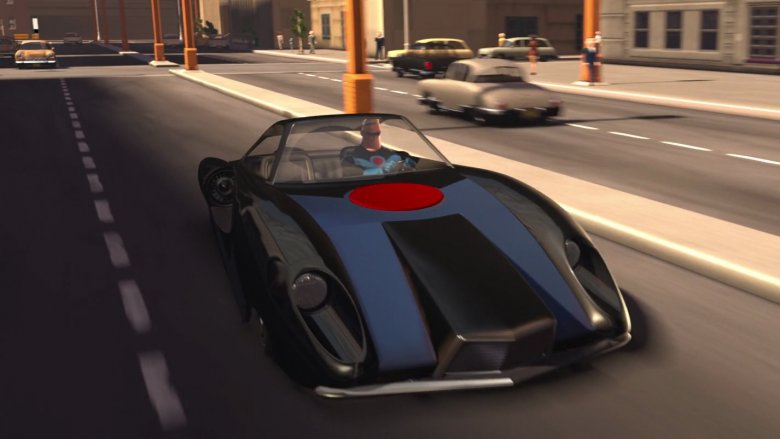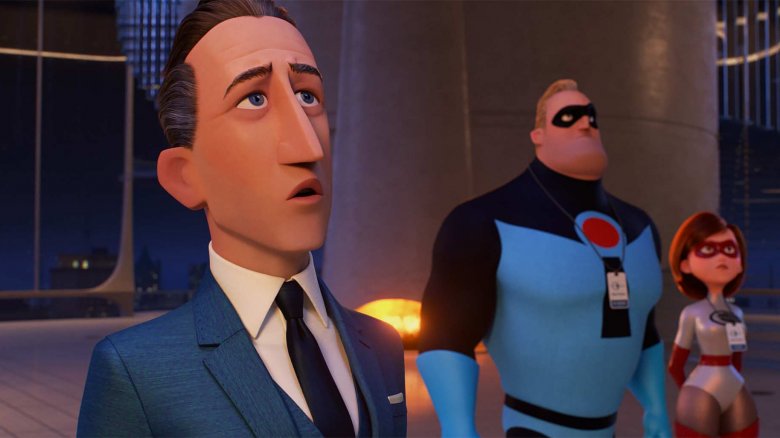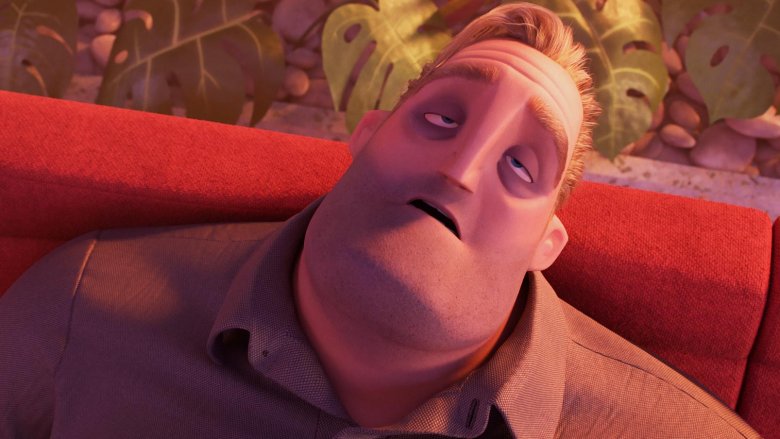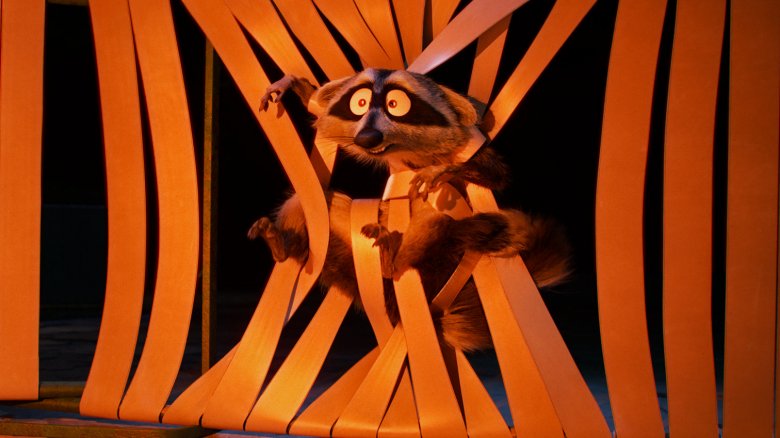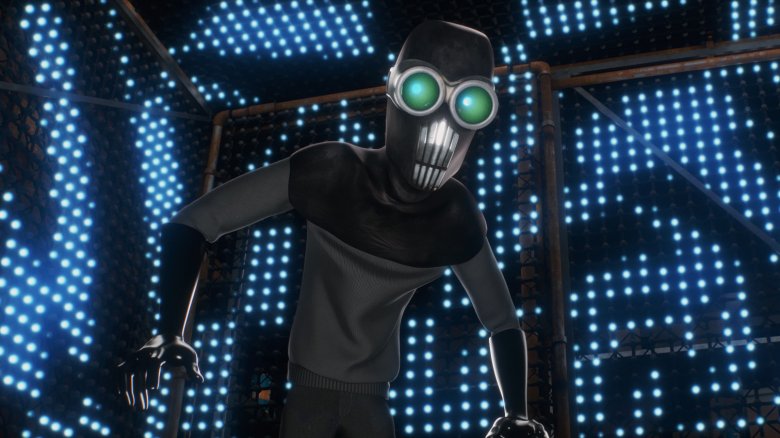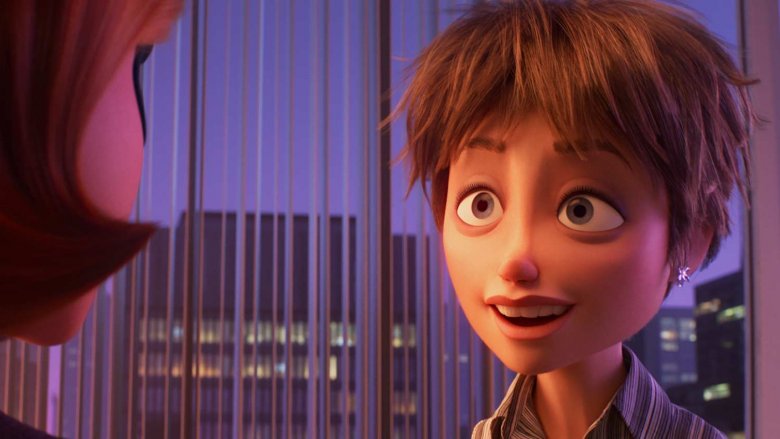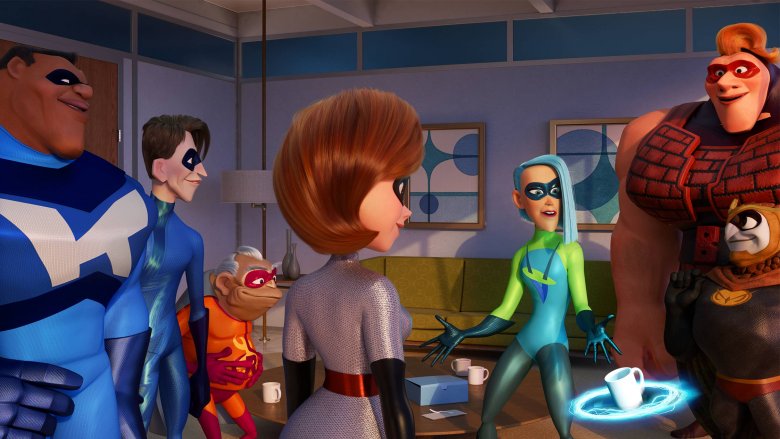Things Only Adults Notice In Incredibles 2
One of the best things about every Pixar Animation Studios film is the seamless blend of adult and childlike sensibilities. They are family films in the truest sense of the word, accessible to viewers of nearly any age while still packing in plenty of details directed at certain segments of the audience. That means parents are more likely to sit through repeat viewings with their kids and be consistently entertained, and that's one of the secrets of the studio's success.
Even among Pixar films, though, the Incredibles franchise has always felt like it has a particularly adult sensibility, for two key reasons. First, the films are meta commentaries on superhero narratives, brought to us by a filmmaker (writer/director Brad Bird) who's allowed his perception of superheroes to evolve from childhood while never losing his childlike love of them. And second, the films are all about family dynamics, and in particular parenting, filtered through a science fiction adventure story. With that intriguing perspective in mind, here are a few things adults notice in Incredibles 2 that kids might have missed.
Post-Super celebrity
Early in Incredibles 2, after the incident with the Underminer (John Ratzenberger), Agent Dicker (Jonathan Banks) informs the Parr family that the government program that's helped them remain hidden for so many years is about to be shut down. They'll be allowed to stay in their hotel (their home was destroyed in the first film) for a couple of weeks, and then they'll have to financially support themselves again. This leaves Bob (Craig T. Nelson) and Helen (Holly Hunter) in a tight spot, and they both start to worry about money, realizing that one or both of them may have to go get a job in the private sector.
It's a relatable narrative, but as the film goes on and the idea that there are people out there who still have an appetite for superheroes is reinforced, it raises an interesting question: why don't they take advantage of their lives as former Supers? Even if they did it using their secret identities, is there no one out there who'd like to read the memoirs of Mr. Incredible? Wouldn't there be an audience for a docu-series about the lives of a married couple who also happen to be retired Supers? Sure, it raises the issue of putting their kids at risk, but they could always keep that aspect of their lives hidden. They get to control the narrative, so why don't they use it? The possibilities are intriguing, to say the least.
Memory tampering
The film opens with Tony (Michael Bird), Violet Parr's (Sarah Vowell) crush, recounting to Dicker how he saw the Incredibles suited up in a parking lot, ready to do battle with the Underminer, and how he accidentally discovered that Violet was a Super. To keep Violet's identity secret, Dicker uses a memory-wiping device to extract Tony's knowledge of this accidental revelation, but we later learn he took much more than that. It turns out that Tony doesn't remember Violet at all, doesn't show up for their date, and asks Violet who she is when she confronts him at school.
When Bob calls Dicker to complain, Dicker simply shrugs and says that using the memory device is "not an exact science." Setting aside how sophisticated other aspects of technology are in this universe, this raises the question of just how many other things this process has messed up. Have people had their memories wiped and forgotten their anniversaries or neglected to show up at their own wedding? Is there a father out there who now has no memory of the day his son was born because he also happened to discover a Super's secret identity that day? It's not something the film explores further, but suffice it to say, it's unsettling.
Dangerous artifacts
Midway through the film, Bob turns on the TV to discover that the Incredibile (the tricked-out car he used in his superhero days) is now in the hands of a rich collector who's showing it off to the public. Bob angrily recalls that he was told the car was destroyed and far beyond repair, and now it's not only intact, but in the hands of some guy he's never met. A furious Bob remembers he still has the remote control, and activates the car's rocket boosters from afar, nearly hitting some bystanders in the process.
The car ultimately returns to the family in the film's climax, but this subplot brings up another unexplored aspect of the world of the Incredibles: there are definitely other superhero artifacts floating around out there. Supers are outlawed, but for the right price, someone was able to obtain a whole car that used to belong to one. What else could money buy you if you're a Super enthusiast with an unlimited budget? An Iron Man-style flight suit with weapons the military never confiscated? An invisible plane? A whole secret lab of bizarre and deadly gadgets? The black market in this universe must be a wild place.
Devtech's legal issues
It's established early and often in the world of The Incredibles that Supers have been outlawed, and therefore the Parr family isn't legally supposed to be suiting up and using their powers to fight crime. After their fight with the Underminer, they're detained and chastised before the government is persuaded to release them. Then, Winston Deavor (Bob Odenkirk) shows up in their lives.
A superhero fan since childhood, Deavor is determined to use all of the resources of his company, Devtech, to turn the tide of public and political opinion and legalize Supers again. He hopes to do this by providing a positive public perception of superheroes through Elastigirl's exploits. So, Helen heads back to work as a costumed hero, and right away she seems to be saving lives while winning hearts and minds.
Here's the problem, though: as Violet points out, even though her mother is working for Devtech, her actions as a Super are still illegal. She's still breaking the law, and yet after the train rescue she's on television giving an interview as Elastigirl. Why isn't she detained? Is she on the Devtech payroll? Is it legal to bankroll a Super even while it's illegal to be one? Devtech is on some shaky judicial ground.
Bob is kind of a jerk
When it becomes clear that Winston wants Helen to lead his Super PR mission, the Parr family must make a decision, but for Bob it's not a hard one. Helen must return to life as a Super so that they can all eventually return to being Supers and the whole family will be better off. Helen takes the job, and Bob begins a long cycle of being... well, a bit of a jerk.
For one thing, he's not really thinking about the family. He's thinking about the day when he can suit up and be Mr. Incredible again, and he's just biding his time until then. Later, when Helen actually starts to do well at her new job, he not only gets angry, but lies to her about Jack-Jack's powers so that she won't come back home and see how he's handling the situation. Then, he tries to take care of Violet's romantic problem with Tony on his own, and ends up manipulating the lives of two teenagers through an awkward lunch. Oh, and when he does decide to help his son with his homework, it's out of spite, because he's so irritated by Helen's success. Sure, Bob eventually gets a more thoughtful, but for someone who likes to think of himself as a hero, he sure spends a lot of the film sulking, complaining, and being more than a little self-serving.
Powerful babies
As the trailers for Incredibles 2 made clear from the start, this is the film in which the rest of the Parr family learns that baby Jack-Jack has powers. In fact, Jack-Jack has numerous powers. He's a "polymorph," as Edna Mode ultimately explains, which means he can do everything from shooting lasers out of his eyes to multiplying himself. Bob makes this discovery one night after Jack-Jack sees a raccoon rummaging through the family's trash and decides to take matters into his own tiny hands.
It's a fun sequence, but one thing becomes very clear: Jack-Jack is definitely trying to murder the poor creature by (among other things) setting fire to one of the lawn chairs the raccoon is trapped in. This, of course, is not Jack-Jack's fault. He's trying to defend the home from an intruder and, as a baby, has no sense of the moral weight that comes with killing a small mammal. Bob gets to him in time for the raccoon to get away, but we're left wondering not just what would have happened if Bob hadn't stepped in, but what kinds of horrible damage superpowered babies have done in this world in the past. You know how annoying it can be to sit next to a baby on a plane? Imagine if that baby had the power to ground your flight permanently.
The villain kind of has a point
During the monologue in which she lays out her entire motivation for Helen, Evelyn Deavor (Catherine Kenner) declares that "superheroes make us weak." Evelyn (whose name is basically "evil endeavor," just in case you didn't catch that) didn't learn the same lessons about Supers that her optimistic brother did. Her parents died because their house was being robbed and they tried to call their Super friends rather than hiding in their in-house panic room. She believes she grew up in a culture that was taught to idolize and ultimately depend on Supers, and that culture is weaker for it.
Her plan to stop this — which involves mass hypnosis, a fake supervillain, and a plot to discredit all Supers forever — is flawed and insane, but her ideology is not without merit, at least in this universe. It is more than a little ridiculous that, rather than hiding out in a panic room and waiting for law enforcement to arrive, Evelyn and Winston's father decided to call his outlawed superhero friends not once, but twice, and lost his life for it. That kind of worldview is skewed, and it does seem his hero worship is what skewed it, so you can't really blame her for being angry.
Evelyn's resources
Evelyn's anger at superheroes and the culture that idolizes them is palpable and, in some ways, justifiable. That doesn't change the fact that the way she chooses to "fix" things is ridiculous, and not just because she has a very twisted worldview. She wants to discredit Supers once and for all by concocting a massive scheme that will give the appearance that they're dangerous, and she does this by pretending to follow along with her brother's plans to revive Supers, creating all sorts of useful and extremely powerful gadgets along the way. As far as we know, though, this is really all she's done to advance her cause of making the world better by ridding it of Supers (who were, let's remember, not even legal when she started to set this plan in motion).
Evelyn is a technological genius capable of making everything from super-advanced telecommunications devices to superhero body cameras to electric motorcycles, and yet all of that prowess seems to be devoted to this one cause. Why not use some of those resources to make regular people a little more super, to give them the chance to be a little safer, stronger, and healthier all on their own? She could use technology to show people they don't need Supers, and instead she tries to get Supers banished by framing them with twisted tech. Granted, we wouldn't have a movie if she didn't do it that way, but it's still something worth pondering.
Another dimension?
At two different points in Incredibles 2, the film acknowledges something intriguing and even potentially world-altering, and both times it's simply passed over without any real further exploration. Both Jack-Jack and a new Super known as Voyd (Sophia Bush) have the power to access another dimension. Voyd is able to send objects and people through space by moving them into the other dimension and then back out again in a different location, and Jack-Jack is able to send himself on a similar journey, apparently hearing his father's voice the whole time.
So, there's another dimension in the Incredibles universe. We don't know how big it is, what's in it, or if it can be explored by scientific means, but certain Supers can access it and apparently move things through it without harming them. The only time it's really discussed is when Bob, tired and weary, acknowledges that he can communicate with Jack-Jack even when he's in the other dimension. Maybe the implications of this are simply too big for this film to contain. Perhaps it's the sort of thing that will have to wait until Incredibles 3.
